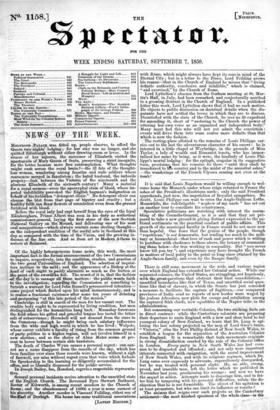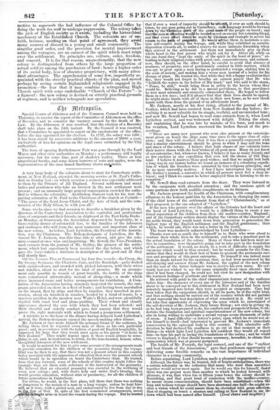There is still some movement in the wide and various
region over which England has extended her Colonial action. While our separated colonies, the United States, are struggling, not hopelessly, with the great questions that obstruct their final consolidation,— unsettled boundaries like that of Texas, and unsettled social ques- tions like that of slavery, in which the Senate has just conceded a measure to facilitate the capture of fugitives,—our conquered provinces of India send us reports of new border wars waged by the jealous Afreedees, new plots for escape and retaliation among the captured Sikh chiefs, new squabbles of the Napier tribe in the talminotration.
But concerning our veritable Colonies, the two striking facts are in direct contrast : while the Canterbury colonists are preparing their departure to unite England with a new and dose bond to her youngest colony of New Zealand, we learn that Dr. Lang is agi- tating the last colony projected On the map of Lord Grey's brain, "Victoria," ohm the Port Phillip district of New South WaleS, to establish a league for the separation of the Australian Colonies from England. It is remarkable that both movements originate in strong dissatisfaction created by the rule of the Colonial Office in London. Every party in New South Wales has had occa:- aion to be disgusted and offended ; and not only were important interests connected with emigration, with the moral improvement of New South Wales, and with its religious regimen, which Dr. Lang came over expressly to advocate, superciliously disregarded, but he was treated with personal slight. He, an able, strong, proud, and irascible man, left the letter which we published in November last year, proclaiming his wrongs ; and now we have the sequel in action. Attempts made to disparage him, and to fet- ter him by tampering with his personal difficulties, refute the de- claration that he is not formidable. The object of his agitation is at least premature' but who can limit its influence or results ? The animus that reigns over such projects as the Canterbury settlement—the most finished specimen of the whole class--ia the
motive to supersede the bad influence of the Colonial Office by doing the work too weli to undergo suppression. The colony takes the pick of English society as it exists, including the hierarchical machinery of the Established Church. The colonists are of one faith, because, meeting on that point of agreement, they many sources of discord in a young and small community. The singular good order, and the provision for mental improvement among the voyagers, are an earnest of the spirit which must reign over the settlement. Its principles are, culture, order, freedom, and concord. It is for that reason, unquestionably, that the new colony is distinguished from others by the large proportion of actual settlers among the purchasers of land : hence a higher order of its social body, less of absentee proprietary, with many atten- dant advantages. The apprehension of some few, imperfectly ac- quainted with the strictly practical objects of the plan, and moved perhaps by seeing certain highminded religionists engaged in its promotion—the fear that it may combine a retrograding High Church spirit with some undefinable "Church of the Future "—is a figment : the new colony is devised on strictly practical grounds of regimen, and is neither retrograde nor speculative.



























